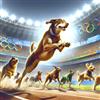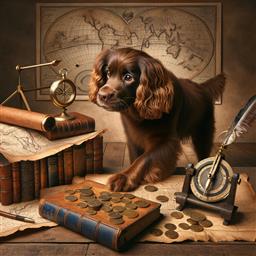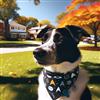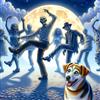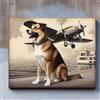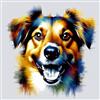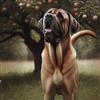16th Century Dog Names - Page 3
Updated: April 30, 2024
Welcome to a historical journey that will whisk you back to the grand era of the 16th century. A time of exploration, scientific discovery, and the Renaissance, it was a period when naming practices for our four-legged companions were as unique and meaningful as they are today.
Our furry friends have been our loyal companions for centuries, and their names often reflected the trends, culture, and societal norms of the time. In the 1500s, dog names were inspired by everything from ancient mythology to popular literature, and from noble ranks to common occupations.
This page presents an intriguing collection of canine appellations from the 16th century. These names, curated from historical records and popular tales, offer a fascinating glimpse into the past, providing not just naming ideas but also a unique insight into the lives and interests of people from this historical period.
| Name | Reason to Choose |
|---|---|
| Galatea | From Greek mythology, with Renaissance scholars having a renewed interest in ancient cultures |
| Galileo | Galileo Galilei, a key scientist of the 16th century, shares a great name for a dog |
| Goneril | Character from King Lear |
| Guinevere | King Arthur's queen, a legendary figure popularized during this era |
| Hamnet | This was the name of William Shakespeare's son |
| Hans | Common name of the time, popular in Northern Europe |
| Hector | Derived from the Trojan prince in Greek mythology, a subject of interest in the 16th Century |
| Hera | Taken from Greek mythology, reflecting the era's fascination with ancient cultures |
| Heraclitus | Reflects the era's revival of interest in ancient Greek philosophy |
| Hercules | Reflects the fascination with Greek mythology during the 16th Century |
| Hero | From Much Ado About Nothing |
| Herodotus | Reflects the era's interest in ancient history |
| Hipparchus | Reflects the era's interest in ancient Greek astronomy |
| Hippocrates | Reflects the era's advancements in medical science and interest in ancient Greek physicians |
| Hippolyta | Hippolyta, a character from 16th century literature, shares a fitting name for a dog |
| Holbein | After Hans Holbein, a significant artist of the 16th century, it's a distinguished name for a dog |
| Homer | Reflects the era's fascination with ancient Greek literature |
| Horatio | Character from Hamlet |
| Huguenot | Named after the Huguenots, members of the Protestant Reformed Church of France |
| Iago | Character from Othello |
| Ignatius | Derived from the founder of the Jesuits, a significant religious figure |
| Isabella | A popular name during the reign of Queen Elizabeth I |
| Johannes | Inspired by Johannes Kepler, an important 16th Century astronomer |
| Juliet | Romeo's lover in Shakespeare's play |
| Lancelot | Named after a knight of the Round Table in Arthurian legend, popular during the period |
| Lear | Title character in King Lear |
| Leonardo | Named after Leonardo da Vinci, a prominent figure of the 16th century |
| Lope | Lope de Vega, a notable playwright of the 16th century, shares a suitable name for a dog |
| Lucretia | A common name in the Italian Renaissance |
| Luther | Taken from Martin Luther, a key figure in the Protestant Reformation |
|
Suggest:
|
Submitted!
|
| 1 2 3 4 5 | |
Explorers' dog names
| Name | Description |
|---|---|
| Amerigo | Named after Amerigo Vespucci, the Italian explorer who demonstrated that Brazil and the West Indies did not represent Asia's eastern outskirts |
| Balboa | The Spanish explorer Vasco Núñez de Balboa, who was the first European to see the Pacific Ocean, is the source of this name |
| Barentsz | Willem Barentsz, a Dutch navigator, cartographer, and Arctic explorer, gives this name its historical significance |
| Cabot | John Cabot, a noted Italian explorer, gives this name historical significance |
| Cabral | Pedro Álvares Cabral, a Portuguese nobleman and explorer who was the first European to see Brazil (April 22, 1500), provides the basis for this name |
| Cano | Juan Sebastián Elcano, who completed the first circumnavigation of the Earth, gives this name its historical significance |
| Cartier | Jacques Cartier, who claimed what is now Canada for France, provides the basis for this name |
| Champlain | Named after Samuel de Champlain, who founded New France and Quebec City |
| Columbus | For the famous explorer Christopher Columbus who sailed the ocean blue in 1492 |
| Cook | The explorer James Cook, who achieved the first recorded European contact with the eastern coastline of Australia and the Hawaiian Islands, is the inspiration for this name |
| Coronado | Named after Francisco Vásquez de Coronado, known for his expedition to the Seven Cities of Gold |
| Cortez | Named after Hernán Cortés, who led an expedition that caused the fall of the Aztec Empire |
| DaGama | Vasco da Gama, the first European to reach India by sea, is the source of this name |
| DeLeon | Named after Juan Ponce de León, who led the first known European expedition to Florida |
| Desoto | Hernando de Soto, famous for his exploration of North America, is the inspiration here |
| Drake | This name pays homage to Sir Francis Drake, the English sea captain and privateer |
| Frobisher | Martin Frobisher, known for his attempts to discover a Northwest Passage, is the source of this name |
| Gilbert | Sir Humphrey Gilbert is commemorated with this name, as a pioneer of the English colonial empire in North America and the Plantations of Ireland |
| Hudson | Inspired by Henry Hudson, an English sea explorer and navigator in the early 17th century |
| Magellan | Named after Ferdinand Magellan, the first explorer to circumnavigate the Earth |
| Pizarro | Francisco Pizarro, the conqueror of the Inca Empire, is the inspiration here |
| Raleigh | This name pays homage to Sir Walter Raleigh, an English landed gentleman, writer, poet, soldier, politician, courtier, spy and explorer |
| Tasman | Abel Tasman, best known for his voyages of 1642 and 1644 in the service of the Dutch East India Company, is the inspiration for this name |
| Vasco | Inspired by Vasco da Gama, the first European to reach India by sea |
| Vespucci | Amerigo Vespucci, the explorer after whom America is named, is the inspiration for this name |
|
Suggest:
|
Submitted!
|
Mythological dog names
| Name | Description |
|---|---|
| Apollo | Greek and Roman god of music, truth, prophecy, healing, sun and light |
| Ares | Greek god of war |
| Artemis | Greek goddess of hunting, wilderness, wild animals and chastity |
| Atlas | A titan condemned to hold up the sky for eternity in Greek mythology |
| Bacchus | Roman god of wine, fertility and agriculture |
| Cerberus | The infamous three-headed dog guarding the underworld in Greek mythology |
| Cupid | Roman god of desire, erotic love and affection |
| Diana | Roman goddess of the hunt, moon and childbirth |
| Hades | Greek god of the underworld |
| Hera | Greek goddess of women, marriage, family and childbirth |
| Hercules | A divine hero in Greek mythology, son of Zeus |
| Horus | An ancient Egyptian deity often depicted as a falcon |
| Isis | Egyptian goddess of magic and life |
| Juno | An ancient Roman goddess, wife of Jupiter |
| Jupiter | The king of the gods in Roman mythology |
| Mercury | Roman god of trade, profit and commerce |
| Minerva | Roman goddess of wisdom and strategic warfare |
| Neptune | Roman god of the sea |
| Nyx | Greek goddess of the night |
| Orion | Named after a giant huntsman in Greek mythology |
| Osiris | Egyptian god of the underworld and rebirth |
| Pluto | Roman god of the underworld |
| Poseidon | Greek god of the sea |
| Venus | Roman goddess of love and beauty |
| Zeus | King of the gods in Greek mythology |
|
Suggest:
|
Submitted!
|
Literary dog names
| Name | Description |
|---|---|
| Balthasar | Inspired by a character in 'Romeo and Juliet' |
| Banquo | Inspired by a character in 'Macbeth' |
| Beatrice | Inspired by a character from 'Much Ado About Nothing' |
| Benvolio | A character from 'Romeo and Juliet' |
| Caliban | From 'The Tempest', one of Shakespeare's plays |
| Cordelia | A character from 'King Lear' |
| Cressida | A character from Shakespeare's 'Troilus and Cressida' |
| Desdemona | Inspired by a character from 'Othello' |
| Faustus | From Christopher Marlowe's tragedy 'Doctor Faustus' |
| Hamlet | The main character in one of Shakespeare's most famous plays |
| Horatio | Hamlet's loyal friend in Shakespeare's 'Hamlet' |
| Iago | A character from Shakespeare's 'Othello' |
| Lear | Named after the tragic king in 'King Lear' |
| Malvolio | From 'Twelfth Night', one of Shakespeare's plays |
| Mercutio | Romeo's witty friend in 'Romeo and Juliet' |
| Oberon | The king of the fairies in 'A Midsummer Night's Dream' |
| Orlando | A character from 'As You Like It' |
| Othello | Inspired by the title character of Shakespeare's tragedy |
| Portia | A character from 'The Merchant of Venice' |
| Prospero | Named after the protagonist in William Shakespeare's 'The Tempest' |
| Puck | From Shakespeare's 'A Midsummer Night's Dream' character |
| Romeo | From the tragic romantic hero in 'Romeo and Juliet' |
| Rosencrantz | A character from 'Hamlet' |
| Titania | The queen of the fairies in 'A Midsummer Night's Dream' |
| Viola | Inspired by a character from 'Twelfth Night' |
|
Suggest:
|
Submitted!
|
Historical figures' dog names
| Name | Description |
|---|---|
| Anne | After Anne Boleyn, Queen of England and wife of Henry VIII |
| Bacon | For Sir Francis Bacon, English philosopher and statesman |
| Calvin | For John Calvin, French theologian and reformer |
| Catherine | Named for Catherine de' Medici, Queen of France |
| Cervantes | Named for Miguel de Cervantes, famed Spanish writer |
| Columbus | Named for Christopher Columbus, Italian explorer |
| Copernicus | After the Polish astronomer, Nicolaus Copernicus |
| Elizabeth | In tribute to Queen Elizabeth I of England |
| Erasmus | In honour of Desiderius Erasmus, Dutch philosopher |
| Ferdinand | After King Ferdinand II of Aragon |
| Francis | After Sir Francis Drake, English sea captain |
| Galileo | In honour of Galileo Galilei, the famous Italian astronomer |
| Henry | For King Henry VIII of England |
| Ignatius | Named for Ignatius of Loyola, Spanish priest and theologian |
| Isabella | For Queen Isabella I of Spain |
| Leonardo | For Leonardo da Vinci, the Italian polymath |
| Loyola | After St. Ignatius of Loyola, founder of the Jesuits |
| Luther | In remembrance of Martin Luther, the German professor of theology |
| Magellan | In remembrance of Ferdinand Magellan, Portuguese explorer |
| Mary | In honour of Mary, Queen of Scots |
| Nostradamus | After the French astrologer, known for his prophecies |
| Raleigh | Named after Sir Walter Raleigh, an English explorer from the 16th century |
| Suleiman | After Suleiman the Magnificent, Sultan of the Ottoman Empire |
| Vespucci | After Amerigo Vespucci, the Italian explorer |
| Zwingli | In remembrance of Huldrych Zwingli, leader of the Reformation in Switzerland |
|
Suggest:
|
Submitted!
|
Royal dog names
| Name | Description |
|---|---|
| Anne | Anne Boleyn, Henry VIII's second wife, is the inspiration |
| Bourbon | Derived from the House of Bourbon, a dominant European royal house of the time |
| Catherine | Catherine of Aragon, Henry VIII's first wife, is the inspiration |
| Charles | Charles V was the Holy Roman Emperor in the 16th century |
| Clement | Pope Clement VII held office in the 16th century |
| Edward | Edward VI of England ascended to the throne as a boy in this era |
| Elizabetha | A nod to Queen Elizabeth I, who ascended to the throne in this era |
| Ferdinand | Honors King Ferdinand II of Aragon, a significant 16th century monarch |
| Francis | Francis I of France was a significant 16th century monarch |
| Habsburg | The Habsburg Monarchy was a major European power during this time |
| Henricus | Inspired by King Henry VIII, a prominent 16th century royal |
| Isabella | Pays tribute to Queen Isabella I of Castile, a renowned queen of the era |
| James | James V of Scotland was a noteworthy monarch of the era |
| Joanna | Joanna of Castile was a significant royal figure in the 16th century |
| Julius | Pope Julius II was a notable religious figure in the 16th century |
| Leo | Pope Leo X was a prominent religious figure in the 16th century |
| Leopold | Leopold I was a member of the House of Habsburg, prominent in this era |
| Margaret | Margaret of Austria was a notable Duchess of Savoy in the 16th century |
| Mary | Mary I of England, also known as Bloody Mary, reigned in this era |
| Maximilian | Maximilian I was Holy Roman Emperor in the early 16th century |
| Medici | The Medici family held significant political power in Italy during the 16th century |
| Philip | Philip II of Spain was a major figure in the 16th century |
| Stuart | The Stuart dynasty began in Scotland in the late 16th century |
| Tudor | Named after the Tudor dynasty, which reigned during the 16th century |
| Valois | Originates from the Valois dynasty in France during the era |
|
Suggest:
|
Submitted!
|
User Submitted Images
There are currently no user submitted images for this page. This is your opportunity to be the first! Submit your photo below.
User Recommendations
There are currently no name recommendations for this page. This is your opportunity to be the first! Make your recommendation below.
Recently Updated
We would like to take this time to thank all of our visitors that make DogNamed.com the best dog naming resource on the web. Our site would not be where it is today without your suggestions, ratings, and photo submissions. So pat yourselves on the back for a job well done and keep up the good work! If you have any comments, suggestions, or ideas for the this page or any part of our site, don't hesitate to drop us a line on our Contact Page. Thank you! -The DogNamed Team


